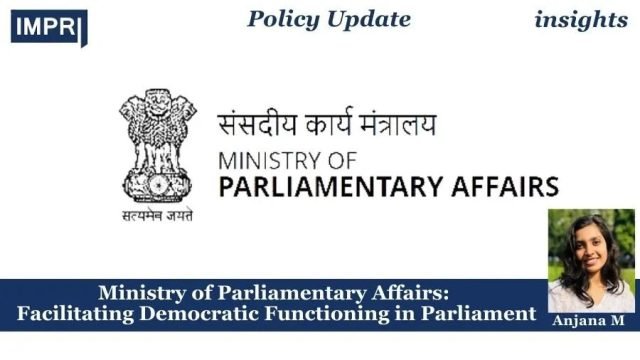Policy Update
Anjana M
Introduction
A Parliamentary Government is a form of government in which all policies and bills regarding governance are formed after discussions and debates among the House of Representatives, which requires time and resources. The parliamentary programmes in India covers numerous intricate matters, including financial, legislative, and non-legislative matters concerning various Ministries/Departments of the Government. Though the ministry is small in size, it is one of the important government ministries.
The Ministry of Parliamentary Affairs is tasked with handling diverse and enormous parliamentary work on behalf of the Government in the Parliament. The Ministry of Parliamentary Affairs serves as an important link between the two Houses of Parliament and the Government in respect of Government Business in Parliament. Created in May 1949 as a Department, it soon became a full-fledged Ministry with the allotment of more responsibilities and functions.
Objectives
- Facilitating coordination among both houses of the Parliament.
- Ensuring the smooth occurrence of Government business at Parliament.
- The Ministry keeps a watch over the progress of Bills from the stage of approval by the Cabinet till the Bill is passed by both Houses of the Parliament. To ensure the smooth passage of Bills.
- The Ministry collaborates with the other Ministries for the prompt and proper implementation of assurances given by Ministers in the Parliament.
- Administering policies relating to Salaries, facilities, and welfare-related matters of Members of Parliament.
- Taking initiatives through organizing conferences, programs, etc., to increase awareness about the Parliamentary system and strengthen the roots of democracy.
Organizational Structure
- Minister of Parliamentary Affairs
- State Minister of Parliamentary Affairs
- Secretary
- Additional Secretary
Source: MOPA
Functions
Functions assigned to the Ministry under the Government of India (Allocation of Business) Rules, 1961, made by the President under Article 77(3) of the Constitution of India:-
- Dates of summoning and prorogation of the two Houses of Parliament, Dissolution of Lok Sabha, President’s Address to Parliament.
- Planning and Coordination of legislative and other official business in both Houses.
- Allocation of Government time in Parliament for discussion of motions given notice of by Members.
- Liaison with the Leaders and Whips of various Parties and Groups represented in Parliament.
- Lists of Members of Select and Joint Committees on Bills.
- Appointment of Members of Parliament on Committees and other bodies set up by the Government.
- Functioning of Consultative Committees of Members of Parliament for various Ministries.
- Implementation of assurances given by Ministers in Parliament.
- Governments stand on Private Members’ Bills and Resolutions.
- Secretarial assistance to the Cabinet Committee on Parliamentary Affairs.
- Advice to Ministries on procedural and other Parliamentary matters.
- Coordination of action by Ministries on recommendations of general application made by Parliamentary Committees.
- Officially sponsored visits of Members of Parliament to places of interest.
- Matters connected with the powers, privileges, and immunities of Members of Parliament.
- Parliamentary Secretaries – functions.
- Organisation of Youth Parliament Competitions in Schools/Colleges throughout the country.
- Organization of All India Whips Conference.
- Exchange of Government-Sponsored Delegations of Members of Parliament with other countries.
- Determination of Policy and follow-up action regarding matters raised under rule 377 of the Rules of Procedure and Conduct of Business in Lok Sabha and by way of Special Mentions in Rajya Sabha.
- Manual for Handling Parliamentary Work in Ministries/Departments.
- The Salaries and Allowances of Officers of Parliament Act, 1953 (20 of 1953).
- The Salary, Allowances, and Pensions of Members of Parliament Act, 1954 (30 of 1954).
- The Salary and Allowances of Leaders of Opposition in Parliament Act, 1977 (33 of 1977).
- The Leader and Chief Whips of Recognised Parties and Groups in Parliament (Facilities) Act, 1998 (5 of 1999).
Initiatives
National Youth Parliament Scheme
The Ministry of Parliamentary Affairs’ Youth Parliament is an initiative designed to educate students about parliamentary procedures, foster democratic values, and encourage active participation in public discourse. The program aims to strengthen the roots of democracy by involving students in simulated parliamentary sittings, where they can debate, discuss, and understand the workings of parliamentary institutions.
Key Objectives:
- Understanding Parliamentary Procedures:
Students learn about the rules, procedures, and conduct of parliamentary proceedings through hands-on experience. - Promoting Democratic Values:
The program instills values like discipline, tolerance, and respect for differing opinions, crucial for a healthy democracy. - Engaging with Public Issues:
Participants develop the ability to analyze and form opinions on various public issues, fostering informed citizenship. - Enhancing Communication Skills:
Youth Parliament provides a platform for students to improve their debating skills, public speaking, and ability to express their views effectively. - Involving Educational Institutions:
The initiative actively engages educational institutions at various levels, from schools to universities, to conduct Youth Parliament sittings.
How it works:
- Simulated Parliamentary Sittings:
Students participate in mock parliamentary sessions, taking on roles of MPs, ministers, and other parliamentary officials. - Debates and Discussions:
Participants engage in debates on various topics, using parliamentary procedures like motions, questions, and resolutions. - National Competitions:
The Ministry of Parliamentary Affairs organizes National Youth Parliament Competitions for universities and colleges, encouraging participation and healthy competition. - Web Portal (NYPS 2.0):
The National Youth Parliament Scheme (NYPS) 2.0 web portal allows for wider participation from educational institutions, groups, and individuals.
Benefits:
- Developing Future Leaders:
By actively participating in Youth Parliament, students develop leadership qualities, communication skills, and a deeper understanding of democratic processes, preparing them for future leadership roles. - Fostering Civic Engagement:
The program encourages students to become active and responsible citizens, contributing to a more engaged and informed society. - Strengthening Democratic Institutions:
By educating the younger generation about parliamentary procedures and democratic values, the initiative helps to strengthen the foundation of democratic institutions.
National eVidhan Application
The National e-Vidhan Application (NeVA) is a digital platform designed to transform the functioning of State and Union Territory Legislatures in India by making them paperless and more efficient. It aims to streamline legislative processes, enhance transparency, and improve member participation through the use of technology. NeVA is a flagship project of the Ministry of Parliamentary Affairs (MoPA).
Key Objectives:
- Paperless Legislatures:
NeVA aims to eliminate the need for physical documents and paperwork in legislative proceedings, promoting a more environmentally friendly and efficient system. - Streamlined Information Exchange:
The platform facilitates the seamless exchange of information between state legislatures and government departments. - Enhanced Member Participation:
NeVA provides members with access to all necessary information, such as notices, bills, and committee reports, through handheld devices, enabling them to participate more effectively in legislative business. - Increased Transparency:
By providing online access to live-streaming sessions, debates, and legislative documents, NeVA promotes transparency and accountability in governance. - Public Portal:
NeVA includes a public portal where citizens can access information about legislative proceedings and other relevant documents.
Key Features:
- Workflow System:
NeVA acts as a workflow system deployed on the NIC Cloud, assisting the Chair of the House in managing proceedings and enabling members to fulfill their duties efficiently. - Secure Platform:
NeVA provides a secure platform for members to submit notices and questions electronically. - Device Neutrality:
The application is designed to be accessible on various devices, including tablets and smartphones, ensuring that all members can participate. - User-Friendly Mobile App:
NeVA has a mobile application, called mNeVA, available on both Android and iOS platforms, making it convenient for members to access information on the go.
Conclusion
The Ministry of Parliamentary Affairs plays a crucial roles in the smooth day-to-day functioning of the parliament and brings coordination between both houses. Its initiatives, like Youth Parliament, should get appropriate attention, and more campaigns should be organised to gain more support among the youth. The Ministry is not free from complications. During the past few sessions, it has been observed that instances of interruptions and disruptions have sometimes even led to the adjournment of the proceedings of the House, which is a huge waste of time and resources and needs immediate resolution. In the early years Rajya Sabha used to meet on average for 90 days in a year.
During the past seven years, however, this number has gone down to an average of 68 days in a year. Due to a reduction in the number of days that the House sits, members have not been able to discuss several issues that have a bearing on public welfare, as well as the issues which palpably can be termed as contentious. There have been instances where delays in laying reports on the table have occurred due to different Committees’ inability to process information in a timely manner, which is often caused by Ministries and Departments All these issues demand immediate attention for the more responsible functioning of the ministry.
References
- Ministry of Parliamentary Affairs. (n.d.). Home. Government of India. Retrieved July 10, 2025, from https://mpa.gov.in/
- Ministry of Parliamentary Affairs. (n.d.). Ministry of Parliamentary Affairs | Government of India | IGOD. Indian Government Open Data Platform. Retrieved July 10, 2025, from https://igod.gov.in/organization/L84zv3QBGZk0jujBKgGW
- National Informatics Centre. (n.d.). Council of Ministers | National Portal of India. Government of India. Retrieved July 10, 2025, from https://www.india.gov.in/my-government/whos-who/council-ministers
- Ministry of Parliamentary Affairs. (2024). Demand No. 73: Ministry of Parliamentary Affairs. Union Budget 2024-25. Government of India. Retrieved July 10, 2025, from https://www.indiabudget.gov.in/doc/eb/sbe73.pdf
- Press Information Bureau. (2024, February 1). Union Budget 2024-25: Key Highlights – Ministry of Parliamentary Affairs. Government of India. Retrieved July 10, 2025, from https://www.pib.gov.in/PressReleasePage.aspx?PRID=2053837
About The Author: Anjana M is an undergraduate student at Miranda House, the University of Delhi, and a research intern at IMPRI.
Acknowledgment: The author sincerely thanks Ms. Aasthaba Jadeja and the IMPRI team for their valuable support.
Disclaimer: All views expressed in the article belong solely to the author and not necessarily to the organisation.
Read More at IMPRI:



















